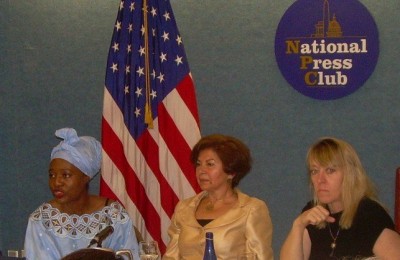
From left to right: Emira Woods, Sorosh Roshan, and Jody Williams.
In June, the Nobel Women’s Initiative arranged a meeting in Vienna to discuss with representatives of the International Atomic Energy Agency’s Board of Governors the possibilities of reducing the risk of war with Iran. The meeting was also an opportunity for Iranian civil society representatives to meet with their U.S. counterparts. Participating in this historic meeting was FPIF’s co-director Emira Woods. The Nobel Women’s Initiative was formed in 2006 by Nobel Peace Prize winners Jody Williams, Shirin Ebadi, Wangari Maathai, Rigoberta Menchú Tum, and Betty Williams.
On their return to the United States, several U.S. participants held a press conference at the National Press Club. Here are excerpts from their statements:
Jody Williams:
How do we resolve the problems facing us in this world? Is it always by war? And as we can see by the situation in Iraq, you know, who’s suffering? It’s the families, the women, the children. They have not been given freedom, they have not been given democracy; they’ve been given civil war.
Anywhere you can begin to get rid of nuclear weapons is a positive step toward the possibility of global change. I still think it’s the responsibility of the five formerly declared nuclear states to lead the world to nuclear disarmament as they oblige themselves to do under the Nuclear Nonproliferation Treaty (NPT). What they want is no nukes for anybody else and nukes for themselves. And if I’m somebody else, I’m sorry, I’m not going to give up my nukes if those five don’t.
Jody Williams received the Nobel Peace Prize in 1997 for her work to ban landmines worldwide.
Sorosh Roshan
America is a superpower. And nothing can be done without American interference. But please let us accept that Iran is also a major power in the Middle East. And without the active, respectful, equal participation with dignity of the government of Iran, things cannot get better in the Middle East. So please let us, the civil society, bring our governments together, despite the different agendas they may have.
Democracy has to be a fruit growing out of the people. Let us join our forces together, understand and communicate, to avoid war at all costs. Then we will think later of the details, what the Republicans will do, what the Democrats will do, what the women will do, what student movements will do. At this moment, we all have to have one goal together: no war. No war.
Sorosh Roshan is a doctor and the president of the International Health Awareness Network.
Emira Woods:
We don’t want this push towards militarism. We don’t want another war. We demand direct talks between the United States and Iran unconditionally. We don’t accept the United States putting forward conditions of “Well, once you agree to suspend activity, then we will sit down and talk.” The costs when it came to the war in Iraq were too high: the cost to the United States, the cost to the Iraqis, the cost to the world. We do not want to go down that path again.
Emira Woods is the co-director of Foreign Policy In Focus at the Institute for Policy Studies.
